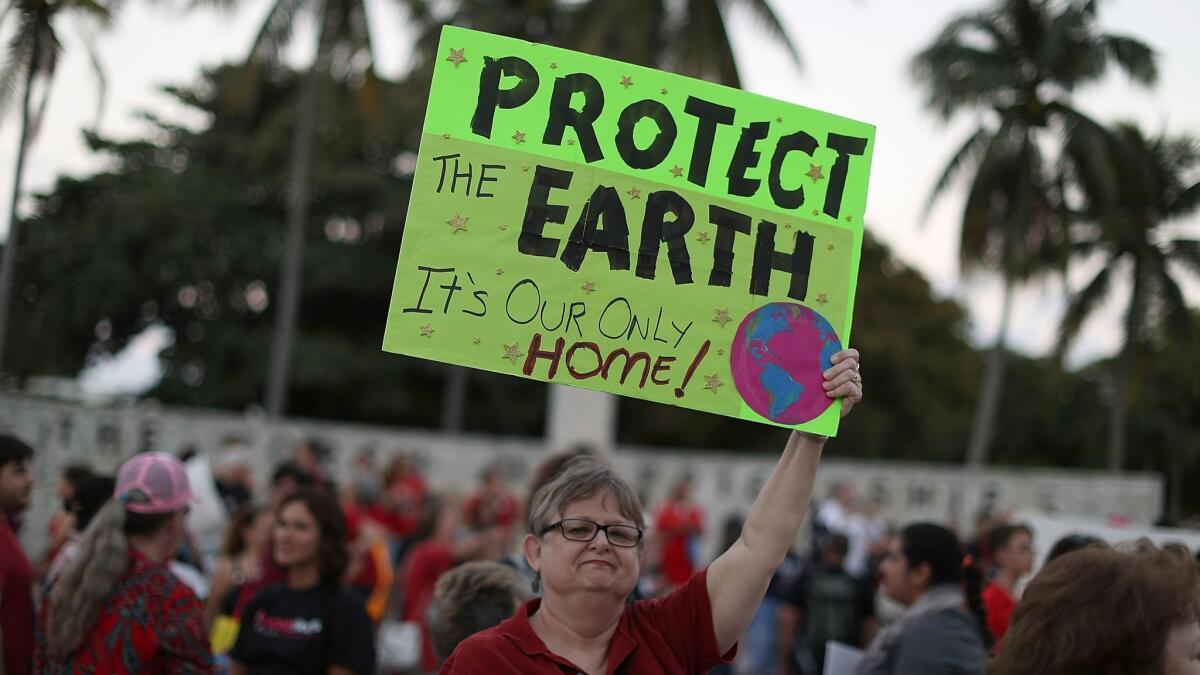Op-Ed: Scientists are marching en masse on Earth Day because we believe reality matters

- Share via
The March for Science on Saturday is expected to draw tens of thousands of scientists and supporters of rational inquiry to the streets of cities and towns across the United States. This is not a protest march. We march to proclaim what we believe is a fundamental tenet of human life: Reality matters.
Science is not a set of facts or even techniques and procedures. Science is a process for understanding the nature of the world. Scientists begin from the assumption that there is an objective reality, independent of our hopes and desires. We try to understand the nature of that reality through observations and experiments. We get ideas and make models from those observations and from those models, make predictions of what will happen in the future. We test the predictions against reality to see if we are right.
And then, because we know that the easiest person to fool is oneself, we take our research — our intellectual offspring, the prized result of our hard work — and put it in the hands of colleagues, or even a competitor, and ask them to tear it apart, find the flaws and tell us what we did wrong.
The process doesn’t always work — people make mistakes or actively commit fraud. But the system is set up to make it difficult to keep fraud going. Peer review can be so difficult emotionally that many new PhDs decide they’d rather pursue a career that doesn’t involve research. This is an unfortunate downside of science’s effort to find out what is undeniably true.
And society needs the truth.
No one who understands how climate works thinks we can continue to pollute our atmosphere without catastrophic cost.
If climate change is true and we don’t believe it and keep on pouring greenhouse gases into our atmosphere, we will heat the world, do massive harm to ecosystems and destroy coastal cities. The evidence that climate change is real and caused primarily by human action is overwhelming. Yes, there is disagreement about the details — what effect factors other than human action may have, what the models predict for the future, what the relationship is between carbon dioxide concentrations and rate of warming — but such debates define what science is: competing models that, by being different, allow us to better perceive reality.
No one who understands how climate works thinks we can continue to pollute our atmosphere without catastrophic cost. And given that we have already waited for too long to completely stop the process, we need help figuring out how to keep things from getting too bad and how to adapt to the changes we cannot stop.
It isn’t just scientists who need to understand reality. In our post-Industrial Age, the source of social discourse has moved from the printed page (and a handful of nightly news broadcasts) to the Internet, where there is rarely an authority determining what is “fit to print.” The craziest of ideas get equal space with the truth on the Internet. You need to find your own way to the information that matters and to an analysis of its validity. That skill, collecting data and figuring out its significance, is what science is all about.
Everyone needs science. We need scientists researching the difficult, consequential questions, and we all need to be equipped with scientific skills to navigate the flood of data we are confronted with. This is why we march: Reality is real – and it doesn’t care what you believe.
Lucy Jones, founder of the Dr. Lucy Jones Center for Science and Society, retired from the U.S. Geological Survey in 2016. She continues to do earthquake research at Caltech.
Follow the Opinion section on Twitter @latimesopinion and Facebook
More to Read
A cure for the common opinion
Get thought-provoking perspectives with our weekly newsletter.
You may occasionally receive promotional content from the Los Angeles Times.









